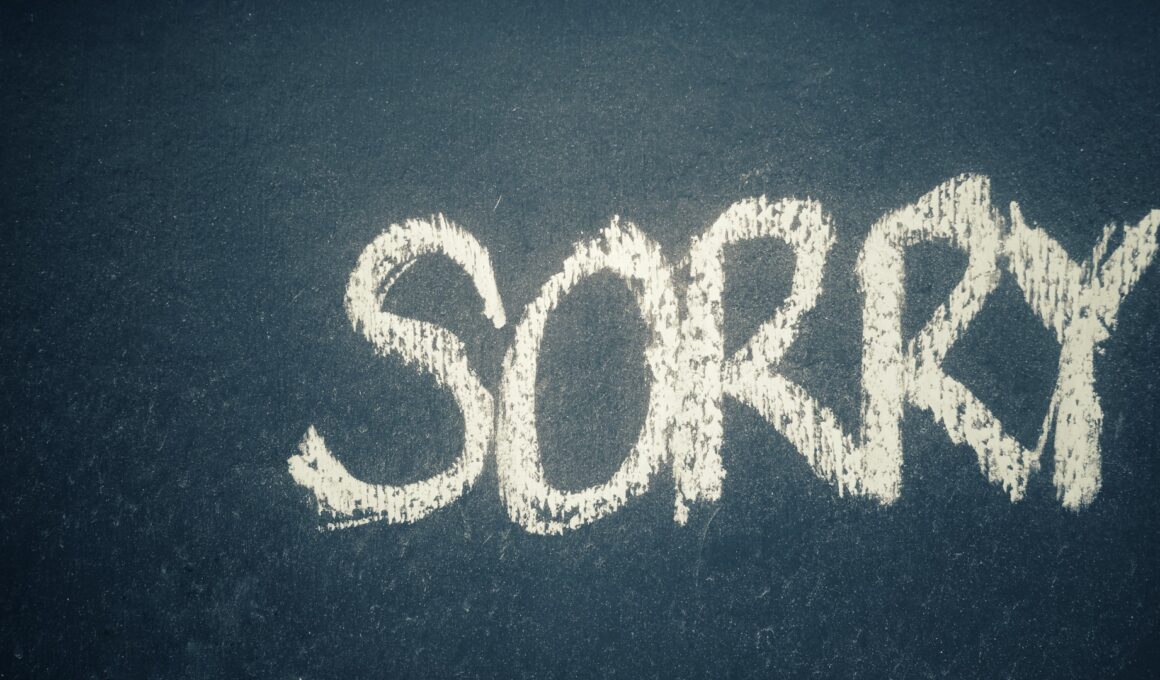Being British I’m generally very good at apologising. It’s a stereotype yes, but it’s also true, and that’s why I’ll often find myself apologising out of context. I’m proud of my manners really, and it’s a good thing to work on saying sorry when you’ve genuinely done something wrong – it will make people less likely to hit you in the face apart from anything else – but when it’s excessive it can become a bad thing. Here we’ll look at why that is, and at how you can stop saying sorry for things that aren’t your fault once it’s become a habit.
Why ‘Sorry’ Should be the Hardest Word
Blame
One of the big problems with saying sorry when something isn’t your fault is that it can lead people to assume that it is your fault. Most people don’t apologise when they have nothing to apologise for, and so if you’re constantly saying sorry to people they’ll start to presume that you’re guilty or to blame. If your team fail to hand a project in on time at work for instance, and you are the only one who comes forward to say sorry, then this will lead your employer to assume that the problem was your fault. Even though you should be applauded for having the gall and for taking responsibility for your team’s actions, this isn’t the way it will come across and you’ll end up losing your employer’s confidence.
Confidence
More seriously though, saying sorry a lot can make you seem less confident and even less competent, which can lead people to start taking advantage of you or even resenting you. If you apologise for not being good at something for instance then you will instantly seem worse at it. One of the very worst things you can do when you start dating someone is to apologise for sex – you might think it didn’t go well and feel the need to point out that you haven’t been with someone romantically for a long time, but in fact all you’ll accomplish when you apologise is to make them remember the sex as being worse than it was. If they’ve had a great time and though it all went swimmingly, then you apologising will cause them to reassess that stance and probably to presume you aren’t very confident or suave. The same goes for apologising for your singing, for your appearance or for your tardiness. If you’re going to arrive an hour late then obviously letting someone know and saying sorry is polite and thoughtful – but if you’re going to be five minutes late it’s better to just ignore it and arrive confidently – thereby making it into less of a big deal and appearing generally more on top of the situation.
Status
Likewise if you apologise every time someone bumps into you, or every time you get into someone’s way, you will be sending very submissive signals. Particularly for men, but also for other groups, every interaction is also a quiet power struggle where one party will emerge as the more dominant of the two. If you constantly say sorry when you’re not in the wrong, then you will very clearly send the signal that you are not the ‘alpha’ in that group, and people will start to realise they can get away with murder. Put simply – if you say sorry every time someone bumps into you then it’s not going to be long before they start doing it more, or giving you things to hold, or just pushing you out the way. Stand your ground figuratively and literally though, and you will find people start to move out of the way for you.
How to Stop Saying Sorry
So if it’s already hardwired into you to keep apologising, how can you go about getting out of that habit?
The simple solution is to practice not saying it. Many of us are under the impression that if we stop saying sorry our friends and colleagues will suddenly grow tired of us and will stop wanting to spend time with us. All of us really know though that this is completely unfounded and in fact being a bit more forceful will in fact be a positive thing in your relationships. The next time you tell someone that no, you can’t help them move today, you should try doing it without the apology on the end and then note how much more confident you sound as a result. Likewise, next time someone bumps into you, practice giving them a glare instead of grovelling and notice that in most cases they will offer an apology instead (it’s important not to go on a power trip here though either… ).
If you find that it’s hard to remember this much of the time, then you can ask your friends to call you on it next time you forget or you can try keeping a reminder on your person such as a coloured bracelet that will regularly catch your eye. If you can manage to keep this up consistently for 30 days, a new habit should form and you’ll find that people start taking you more seriously as a result.




